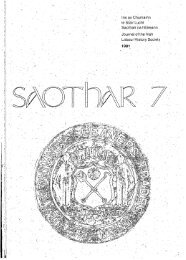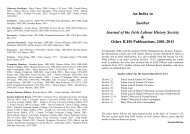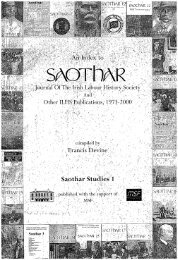10 ··SAOTHAR 13taken great pains to reduce its excesses. Generously they enclosed £5 each.20 Additional support fromthe clergy soon followed when the local parish priest, Rev. Dean A. O'Connell, lent his mime to thecommittee. 21Notto be outdone the army chiefs joined in when ·garrison commander, Major General Falls, senthis contribution to tl)e funds:., .'from the conviction that the proposed abolition will prevent crime amongst. the garrison and maymaterially save the non-commissioned officers and men from exposure to temptation and disgrace.'22 .More support followed from the clergy in the shape of Dr. Yore of St. Paul's and from the aristocracyin the person of Lord Downes, and then from employers on behalf of their workmen. 23 One of these,WilliamBaxter offashionable .Grafton Street, retailer of military footwear, urged every employer inthe city-to induce workmen to subscribe to the fund. The men in his employment had 'in the mostcheerfull1lanner put down a subscription of one shilling each'. 24With such a procession of dignity and worth, it was inevitable that the Association for DiscountenancingViceshouldjoin in. On 21 June it duly did so with a public resolution of support and acontribution of £10.25 Within four months the requisite money had been raised and the proprietors ofthe revenues were accordingly bought out. By indenture dated 17 September, 1855, between themembers of the Madden family on the one hand and the trustees led by the Lord Mayor, Boyce, on theother, the ancient rights to the tolls and customs originally conferred by King John were finallytransferred for extinction.26Congratulations poured in from on high. Fr. Ma thew , the apostle of temperance, wrote from theImperial Hotel on 10 August, 1855 to congratulate the people of Dublin 'on the total removal of thatmoral plague-spOt, Donnybrook Fair':n Five days later, Dr. Paul Cullen, Archbishop of Dublin, issueda circular letter to the clergy, expressing 'sincere delight' at the' measures adopted to suppress the Fair':'Everyone acquainted with the city is aware that that Fair, to say nothing of the loss of time and othertemporal considerations, was the occasion of innumerable offences against God: that riotousness,drunkenness, debauchery and profligacy of every kind prevailed to an awful extent and seemed to walkin it in triumph:'28At the same time, the two commissioners of the DMP, having seen their £10 contribution bearingfruit, now issued ~ notice stating that they'will not permit any hackney car stand in any of the streets of Donnybrook or in any place adjacent thereto:No crowd or.assemblage of persons will be allowed on the Green ... All public houses will be visited bythe police and restricted to legal hours.'29The fair, it seemed, had at last been abolished. Amid all these grave expressions of support andapproval from on high only two small voices managed to squeak in slight notes of disbelief or protest.One, signing himself' An Artizan', wrote on 23 August to reject the idea that those who resorted toDOOllybrook Fair were bad characters and claimed that this was a slur on himself and on the manythousands of artisans who were used to going there and who were determined to uphold 'the onlyremnant ·ofamusement left to them'. 30And even before this letter, while the authorities were rejoicing, one n~.D. of Donnybrook wroteto express astonishment that anyone could call the fair a moral plague-spot - itself a slur on the police,since neither crime nor outrage had been perpetrated in the previous sixteen years. He took issue·seriously with 'the reverend and other gentlemen' who subscribed hugely for 'what they call the generalgood without having consulted any of us on the matter', and whose. actions now threatened the welfareoflocal people who obtained a living from the fair. He ended by throwing down the gauntlet: he invited
<strong>THE</strong> DECLINE AND FALL <strong>OF</strong> DONNYBROOK FAIR 11Dublin friends to continue to pay their annual visit 'as we have ample space on our licensed premisesto entertain and comfortably accommodate the public generally' .31 This J.L.D. was one Joseph DiIIon,none other than the nephew of John Madden who had died in 1850 and whose heirs had sold off the rightsto the abolition committee. A public house owner of the village, Dillun had been the effective organiserof the fair since the death of his uncle in 1850, and naturally was not going to take his own econorriicextinctiun quietIy.32 With his daughter Eliza he took up the task uf reviving Donnybrook Fair; Althoughthe Madden family interest had been bought out, there was nothing to prevent the nephew Dillon fromusing his licensed premises; which included a two and a half acre field facing on to the old faiqsTound,from organising the animal market and th~public.amusements.()(old. To the consternation of clergyand police, this he proceeded to do.. . _. .. .On25 August, 1855 he buldly published in the newspapers a notice of his intentionto.contiriue thefair by accommodating iton his property. When published, this notice appeared beside that of the policein which they hadannuunced their intention to crack down on hackney cab drivers in-the area 'incunsequence of the abolition of Donnybrook Fair' .33 In sume dismay, early in the next year, J.D.Fitzgerald, a legal advisor to the Irish Office in London, confirmed to CuI. Thomas Larcom,Undersecretary at Dublin Castle, that from the legal aspect the abolition committee's wurkhad beenall in vain, and that some special legislation would be needed. 34In the years immediately following the apparent abolition of 1855 Dillon and his daughter Elizacuntinued tu hold the fair in defiance of church and state. For the fair of August 1858-they had a largeposter printed, entitledAmusementfor the Millions, and when the Police Cummissioners sgughtadviceas to its legality they were formally advised that only sume special measure could stop the Dillons. Toadd insult to injury, in anticipation of the fair uf 1859, Eliza Dillon actually wrote to the Commissiunersof police in July: 'I am about holding 'the annual fair at Donnybrook'. And in order to preserve peaceand regularity I humbly require the aid and protection of the Metropolitan Police. '35 -Tu his chagrin the Divisional Superintendent for the area, James McMahun, had to admit that sincethe Custom House records showed her license to be for 'House and Premises', thdaw was not beingviolated by holding festivities and selling drink in the Dillon field. He had to add that as a cunsequenceuf this loophole every day of the fair some 20,000 people visited the village andavailed of theentertainments laid unby the Dillons in 1859; that this, in turn, required the presence. of one hundredofficers and men of the DMP and that' scenes of the most demomlising nature have occurred withinthis enclosure. '36In response to the dilemma nuw posed, the legal officers of the Crown suggested· that the ChiefSecretary should fully support the Dublin police magistrates in refusing to renew theDillons'licence. 37This turned out to be the key weapon in the fight against the Dillons' efforts to preserve the fair. On8 November, 1859 Eliza Dillon' s application for a renewal of the licence came before·the magistratesof College Street Police Office. Superintendent McMahon was happy to report to the PoliceCommissioners that her application had been refused. 38 But, if this louked like the end of the road, itwas not.In the summer of 1860 Joseph Dillon published a placard announcing that Donnybrook Fair wouldbe held this year 'as usual'. He intended to apply for a spirit grocer's licence to replace that refused tohis daughter in November, 1859. Determined to thwart him the Police Commissioners requested theCastle to ask the Commissioners ofInland Revenue in turn tu authurise their Dublin officials to refusethe issue of this licence. 39 With some misgivings Inland Revenue replied on 14 August; 1860. Theyinsisted that they had no legal authority to withhold the licence, but. given thatthe Dublin policer~uesthad the endorsement of the Lord Lieutenant of Ireland,they instructed their Dublin.revenue officials'not to grant licences without further orders'. Nervously the London revenue authorities insisted thatsince they had no power to refuse Dillon 'they must therefore rely upon His Excellency's authority incase theirconduct in refusing the licence should be called in question' .40 The eventual result of theseand further exchanges between Dublin police and Inland Revenue was that no spiritousliquorsor beer(other than ginger beer) were sold'in Dillon's field during the days of the fair, and the police were able
- Page 1 and 2: JOURNAL OF THE IRISH LABOUR HISTORY
- Page 3 and 4: ContentsPageEditorial: Labour Histo
- Page 5 and 6: EDITORIAL 3freedom to participate i
- Page 7 and 8: CorrespondenceThe Irish Labour Part
- Page 9 and 10: ; ~ ; ,The Decline and Fall of Donn
- Page 11: THE DECLINE AND FALL OF DONNYBROOK
- Page 15 and 16: ·' THE DECLINE AND FALL OF DONNYBR
- Page 17 and 18: THE DECLINE AND FALL OF DONNYBROOK
- Page 19 and 20: THE DECLINE AND FALL OF DONNYBROOK
- Page 21 and 22: THE DECLINE AND FALL OF DONNYBROOK
- Page 23 and 24: THE DECLINE AND FALL OF DONNYBROOK
- Page 25 and 26: ,'-,;-''''.A PASSAGE TO BRITAIN 23C
- Page 27 and 28: A PASSAGE TO BRITAIN 25only in the
- Page 29 and 30: A PASSAGE TO BRITAIN 27clothing._De
- Page 31 and 32: A PASSAGE TO BRITAIN 29established
- Page 33 and 34: ;:-.",.- .. .", ...... '.:. '
- Page 35 and 36: LOUIE BENNETI 33feminist movement w
- Page 37 and 38: :... ~: ."
- Page 39 and 40: -.- '.LOUlE BENNETT 37While there i
- Page 41 and 42: LOUIE ~ENNEIT 39Xl's encyclical Qua
- Page 43 and 44: LOUIE BENNEIT 41Bennett's own relat
- Page 45 and 46: LODIE BENNETT 43109; IWWU resolutio
- Page 47 and 48: Essays in ReviewCosherers, Wanderer
- Page 49 and 50: ••• .".'. >. '~"ESSA YS IN RE
- Page 51 and 52: ESSAYS IN REVIEW 49ConnolIy:Myth an
- Page 53 and 54: ESSAYS IN ~EVIEW 51tion' in the Int
- Page 55 and 56: ESSAYS IN REVIEW53International:'I
- Page 57 and 58: REVIEWScontroversy is real history.
- Page 59 and 60: REVIEWSJoe Monks was among the earl
- Page 61 and 62: REVIEWSnolly-Column Song','Proudly
- Page 63 and 64:
REVIEWSresulting from the arrival o
- Page 65 and 66:
REVIEWS,63the book by means of an a
- Page 67 and 68:
REVIEWSlogue, it is hardly surprisi
- Page 69 and 70:
The Team For All Workers ...CULIAIB
- Page 71 and 72:
ESSAYS 69mission and moral refonn.l
- Page 73 and 74:
.. ...... ~.~ -~ .'- '.ESSAYS. 71fr
- Page 75 and 76:
ESSAYS 73claimed authority but whic
- Page 77 and 78:
ESSAYS 75provided the basis for soc
- Page 79 and 80:
ESSAYS 779. For comparisons see E.T
- Page 81 and 82:
ESSAYS 7952. Annals of Christ Churc
- Page 83 and 84:
ESSAYS' 81Fianna Fail and the Worki
- Page 85 and 86:
ESSAYS 83Eireann in 1925 visibly di
- Page 87 and 88:
ESSAYS 85recognition of the impract
- Page 89 and 90:
ESSAYS 871970, it created the condi
- Page 91 and 92:
ESSAYS89The Irish Immigrants' Contr
- Page 93 and 94:
ESSAYS" 91Although anti -Catholic p
- Page 95 and 96:
ESSAYS 93McCowie played a key role
- Page 97 and 98:
:. -,,'.' ',. .~.,:.ESSAYS 95Althou
- Page 99 and 100:
ESSAYS 97young girl of their own ba
- Page 101 and 102:
SourcesIrish Labour History Society
- Page 103 and 104:
SOURCES 101INovember, 1971 to no. 1
- Page 105 and 106:
SOURCES 103would claim credit for t
- Page 107 and 108:
SOURCES105Sources for Irish Labour
- Page 109 and 110:
SOURCES 107NorthWest Archives and L
- Page 111 and 112:
SOURCES 109In 1966 the Finnish gove
- Page 113 and 114:
TURNINGANEWLEAFThe CPSSUis the larg
- Page 115 and 116:
REMINISCENCE 113us due to my politi
- Page 117 and 118:
REMINISCENCE 115when Jim was presen
- Page 119 and 120:
REMINISCENCE 117of Dail Eireann. 17
- Page 121 and 122:
REMINISCENCE 119NotesThe above arti
- Page 123 and 124:
DOCUMENT STUDY 121James Connolly in
- Page 125 and 126:
DOCUMENT STUDY123SOCIAL DEMOCRATIC
- Page 127 and 128:
DOCUMENT STUDY 125proletariat of th
- Page 129 and 130:
DOCUMENT STUDY 127the support of Je
- Page 131 and 132:
DOCUMENT STUDY 12926. The Workers'
- Page 133 and 134:
131BibliographyA Bibliography of Ir
- Page 135 and 136:
BIBLIOGRAPHY 133Compton, P.A. Demog
- Page 137 and 138:
BIBLIOGRAPHY 135Levine, I. and Madd
- Page 139 and 140:
BIBLIOGRAPHY 137Turner, M. 'Towards
- Page 141 and 142:
BIBLIOGRAPHY 1394. Land and Agricul
- Page 143 and 144:
BIBLIOGRAPHY 141Clogher Record12 (2
- Page 145 and 146:
BIBLIOGRAPHY 143Political Research
- Page 147 and 148:
BIBLIOGRAPHY 145Pres, 1987.O'Brien,
- Page 149 and 150:
147Notes on Contributorsf onathanBe
- Page 151 and 152:
1901: Ireland's first general union
- Page 153 and 154:
ELECTRICAL TRADES UNION .Establishe





